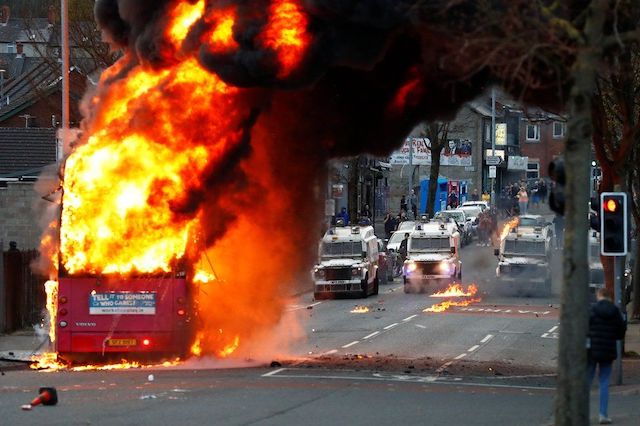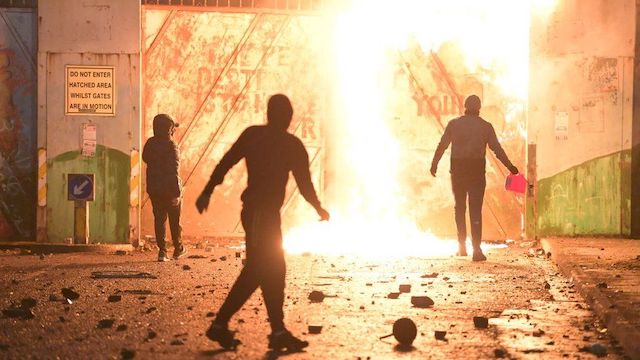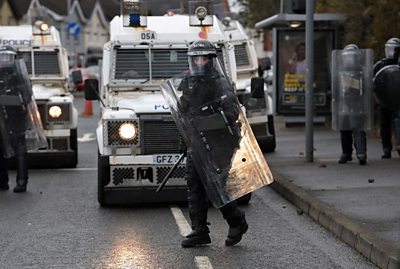April 17, 2021
By Deaglán de Bréadún
Concern has been growing in Ireland, north and south, that the Troubles which caused so many deaths and injuries for thirty years from the late Sixties until the end of the Nineties might be on the way back. The Belfast/Good Friday Agreement was concluded in April 1998, with former US Senator George Mitchell chairing the negotiations, so it is ironic that worries about the durability of the peace have arisen on the 23rd anniversary.
Nobody in their right mind wants to go back to that terrible time when almost 3,500 people died in bombings, shootings or on hunger-strike and thousands upon thousands of others were traumatised by injury or the emotion of losing a close relative or friend.
Since the end of March, there has been a series of riots in a number of towns and cities and almost 90 members of the Police Service of Northern Ireland (PSNI) have suffered injuries. Rioters as young as 12 years were attacking police in locations such as Derry/Londonderry, Belfast, Carrickfergus, Ballymena and Newtownabbey.
Most of the violence has been perpetrated by young loyalists from underprivileged areas. In Northern Ireland, the term ”unionist” generally means someone who wishes to maintain the link with Britain through political means and normally comes from a Protestant middle-class background. Loyalists generally share the political outlook of unionists but they tend to be less well-off and in some, but certainly not all, cases are willing to use violence for that purpose. It is not unlike the distinction between nationalists and republicans on the other side, with some but by no means all in the republican camp prepared to employ physical force to achieve a United Ireland.
Possibly the worst of the recent incidents took place on the night of April 7th in Belfast when a bus was hijacked and set on fire. Shown on TV, it made very disturbing viewing. Petrol bombs, fireworks, bricks and stones were thrown at the police and the gate of a “peace wall” between Catholic and Protestant communities was set alight and smashed open.

Crowds of up to 600 mainly-young people gathered on either side of the peace wall. This was a disturbing sectarian development since up to then the focus had been on clashes between loyalists and the police. A press photographer was also attacked. There are approximately 21 miles of peace walls or similar barriers in Northern Ireland, mostly in Belfast and they have actually increased in height and number since the Good Friday Agreement of 1998.

To its credit, the five-party Stormont Executive which runs the devolved government in Northern Ireland issued a joint statement condemning the violence.
Membership of the Executive ranges from the Democratic Unionist Party (DUP) to Sinn Féin and the statement said: “While our political positions are very different on many issues, we are all united in our support for law and order and we collectively state our support for policing and for the police officers who have been putting themselves in harm’s way to protect others.”
On the night of April 8th alone, 19 officers were hurt and, for the first time in six years, the PSNI used water cannons in their efforts to quell the violence.
At the time of writing, 18 people have been arrested and 15 charged with offences arising from the disturbances. The death of the Duke of Edinburgh on April 9th brought about a lull in the violence as a mark of respect to Queen Elizabeth’s late husband.
It is unclear at present how much of the violence is spontaneous and how much of it is orchestrated. It has been suggested that some loyalist paramilitaries who are involved in many forms of organised crime have been inciting young people to attack the police in response to a recent clampdown on their activities by the forces of law and order.
There have been suggestions from the unionist camp that the violence is connected to loyalist concerns about the so-called “Irish Sea border” which has been put in place as a result of Brexit, the departure of the United Kingdom from the European Union. Customs checks have been introduced as part of the Northern Ireland Protocol for goods arriving across the Irish Sea from Great Britain. The Protocol was devised as a means of avoiding the return of customs posts on the land border between the two parts of the island of Ireland. Northern Ireland has remained in the European single market for goods and products arriving from Britain are subject to EU customs procedures. There is concern among unionists and loyalists that the Protocol is weakening Northern Ireland’s position within the United Kingdom.
Another factor said to be inciting loyalist riots is anger over the fact that no members of Sinn Féin were prosecuted for allegedly breaching Covid restrictions by taking part in the funeral last June of Bobby Storey (64), a leading IRA activist, which was attended by an estimated 2,000 mourners, including Sinn Féin Deputy First Minister Michelle O’Neill, and critics are saying this was a breach of regulations because funeral attendances were officially limited to 30 people. DUP First Minister Arlene Foster has called on PSNI Chief Constable Simon Byrne to resign because of the lack of prosecutions.
Meanwhile, significant moves are underway in the North to relax Covid restrictions in general. A timetable has been introduced for easing the current measures, along with a note of caution that circumstances could change. Progress in tackling the pandemic has been considerably slower south of the border but the number of vaccinations has been growing significantly and there is a new atmosphere of tentative optimism although there is considerable controversy over the requirement that most people arriving from a specific list of countries, including the US, must quarantine on arrival in a designated hotel facility.

Deaglán de Bréadún is a freelance journalist and author based in Dublin. He is a columnist with The Irish News and his books include ‘The Far Side of Revenge: Making Peace in Northern Ireland’ and ‘Power Play: The Rise of Modern Sinn Féin’ as well as three books in Irish. His reporting on the Good Friday Agreement negotiations and their aftermath for The Irish Times won the Northern Ireland IPR/BT award for Daily News Journalist of the Year. Deaglán may be contacted on Twitter @DdeBreadun or by email Ddebre1@aol.com.


Leave a Reply